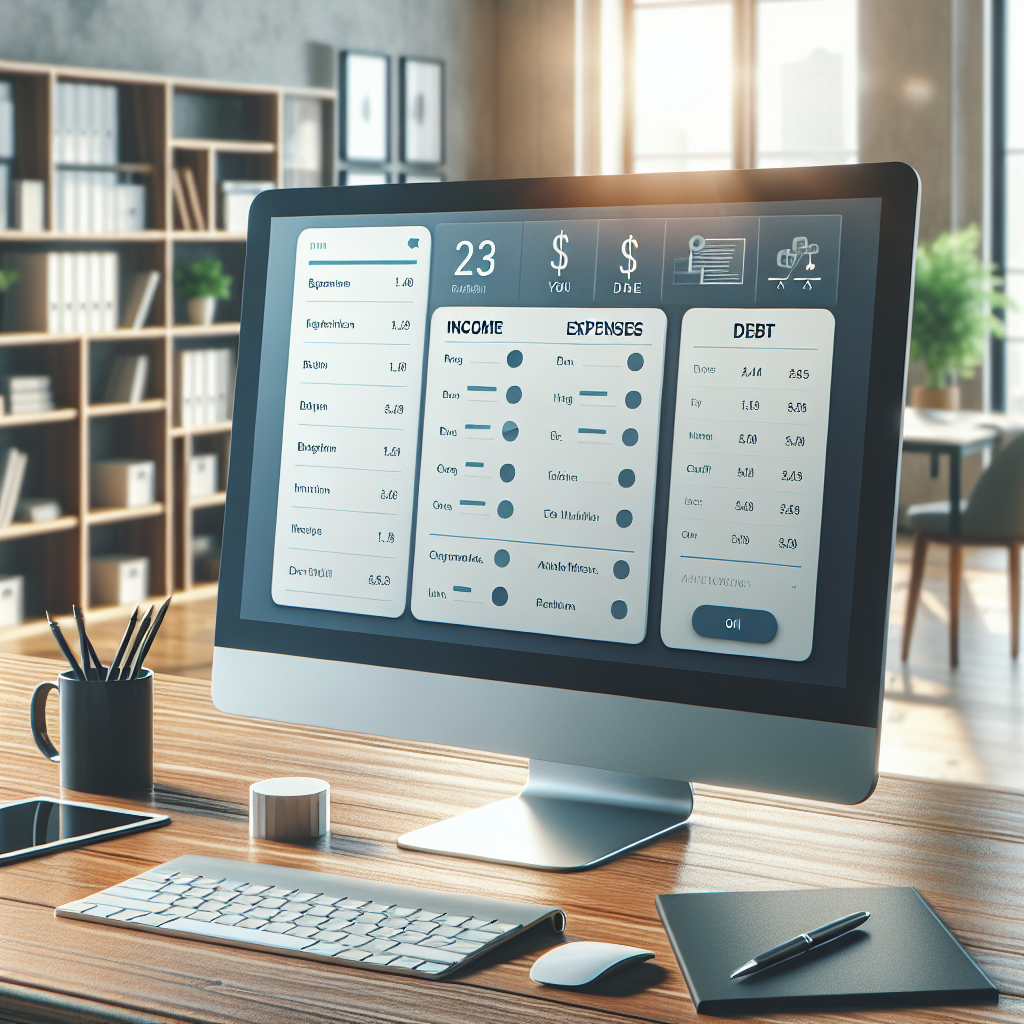In an era where financial stability is paramount, finding effective tools to manage debt is crucial. A budget calculator to pay off debt serves as an invaluable resource to help you plan, track, and ultimately eliminate your financial obligations. This tool allows you to input your income, expenses, and debt details, providing a clear picture of your financial health. By visualizing where your money is going, you can make informed decisions to reduce unnecessary expenditures and allocate more funds toward debt repayment.
Using a budget calculator is not just about tracking numbers; it’s about creating a strategy for financial freedom. Whether you are dealing with credit card debt, student loans, or any other form of debt, this tool can help you devise a tailored repayment plan. The calculator’s ability to simulate various scenarios—such as different interest rates or repayment schedules—enables you to choose the most efficient path to becoming debt-free.
Ready to take control of your finances and experience effortless savings? Download Vala today and start managing your budget with ease!
Understanding Your Debt Situation

Before you can effectively use a budget calculator to pay off debt, it’s essential to have a clear understanding of your debt situation. This involves knowing the total amount of debt you owe, the types of debt you have, and the interest rates associated with each. Start by making a list of all your debts, including credit cards, student loans, mortgages, and any other liabilities. For each debt, note the outstanding balance, minimum monthly payment, and interest rate.
Understanding your debt situation also means being aware of the terms and conditions of your loans. For instance, some debts may have variable interest rates that can change over time, while others may have fixed rates. Additionally, certain loans may have prepayment penalties or other fees that could impact your repayment strategy.
Once you have a comprehensive view of your debt, categorize them into high-interest and low-interest debts. High-interest debts, such as credit card balances, should typically be prioritized for repayment due to the higher cost of interest over time. Conversely, low-interest debts, like federal student loans, can often be managed with more flexible repayment options.
By thoroughly understanding your debt situation, you can make informed decisions when using a budget calculator. This knowledge will enable you to create a more accurate and realistic budget, setting you on a path toward effective debt management and eventual financial freedom.
How a Budget Calculator Can Help
A budget calculator can be an invaluable tool in your journey to pay off debt quickly and efficiently. By providing a clear snapshot of your finances, it helps you allocate your income towards debt repayment while also managing your day-to-day expenses. Here’s how a budget calculator can assist you:
- Tracking Income and Expenses: One of the primary functions of a budget calculator is to help you track your income and expenses. By inputting your monthly earnings and all your expenditures, you get a comprehensive view of where your money is going. This allows you to identify areas where you can cut back and redirect those funds towards debt repayment.
- Setting Financial Goals: A budget calculator can help you set realistic financial goals. Whether your goal is to pay off a specific debt within a certain timeframe or to save a particular amount each month, the calculator can help you plan accordingly. By breaking down your goals into manageable steps, you can stay motivated and on track.
- Creating a Debt Repayment Plan: With a budget calculator, you can easily create a customized debt repayment plan. By calculating the amount you can afford to pay towards your debts each month, the calculator helps you determine the most effective strategy for repayment. This might include the snowball method (paying off smaller debts first) or the avalanche method (tackling higher-interest debts first).
- Monitoring Progress: Regularly updating your budget calculator allows you to monitor your progress over time. By keeping track of your debt balances and repayment efforts, you can see how far you’ve come and make any necessary adjustments to your plan.
Utilizing a budget calculator to manage your finances not only simplifies the process but also empowers you to take control of your debt situation. By making informed decisions and staying disciplined, you can achieve your financial goals more efficiently.
Steps to Create Your Budget

Creating an effective budget is a crucial step towards achieving financial stability and paying off debt fast. Here are the steps you need to follow to create a budget that works for you:
- Gather Financial Statements: Begin by collecting all your financial documents. This includes bank statements, credit card bills, utility bills, and any other records of your monthly income and expenses. Having these documents handy will provide a clear picture of your financial situation.
- Calculate Your Income: Determine your total monthly income. Include all sources of income such as salary, freelance work, side jobs, and any other earnings. It’s important to have an accurate figure to work with.
- List All Expenses: Make a detailed list of all your monthly expenses. Categorize them into fixed expenses (rent, mortgage, insurance) and variable expenses (groceries, entertainment, dining out). Also, don’t forget to include occasional expenses like car maintenance or annual subscriptions.
- Set Financial Goals: Define your short-term and long-term financial goals. Short-term goals might include paying off a specific debt or saving for a vacation, while long-term goals could be building an emergency fund or saving for retirement. Having clear goals will keep you motivated.
- Create a Budget Plan: Allocate your income to cover your expenses and achieve your financial goals. Use a budget calculator to help distribute your funds efficiently. Ensure that you prioritize essential expenses and debt repayment.
- Track and Adjust: Once your budget is in place, track your spending regularly. Monitor how well you are sticking to your budget and make adjustments as needed. If you find that certain categories consistently exceed your budget, find ways to cut back or reevaluate your spending priorities.
By following these steps, you can create a budget that helps you manage your finances effectively and stay on track towards achieving your financial goals. Remember, consistency and discipline are key to successful budgeting.
Tips for Staying on Track

Once you’ve created a budget, the next challenge is sticking to it. Here are some practical tips to help you stay on track and make your budget work for you:
- Set Realistic Goals: It’s crucial to set financial goals that are achievable. Unrealistic goals can lead to frustration and discourage you from sticking to your budget. Start with small, attainable goals and gradually increase them as you see progress.
- Automate Savings: Set up automatic transfers to your savings account. This ensures that a portion of your income goes directly into savings before you even have a chance to spend it. Automation makes saving effortless and helps you build a financial cushion.
- Use Budgeting Tools: Leverage technology to help you manage your budget. Budgeting apps and tools can track your spending, categorize expenses, and provide real-time insights into your financial habits. This makes it easier to identify areas where you can cut back.
- Review Your Budget Regularly: Your financial situation and priorities can change over time. It’s essential to review your budget periodically to ensure it still aligns with your goals. Make adjustments as needed to accommodate any changes in income or expenses.
- Avoid Impulse Purchases: Impulse buying can quickly derail your budget. Before making a purchase, take a moment to consider whether it’s a need or a want. Implementing a 24-hour rule, where you wait a day before buying, can help you avoid unnecessary expenses.
- Find Accountability Partners: Sharing your financial goals with a trusted friend or family member can provide additional motivation to stay on track. They can offer support, encouragement, and even join you in saving or cutting expenses.
- Celebrate Small Wins: Reward yourself for sticking to your budget and achieving your financial milestones. Celebrating small wins can keep you motivated and reinforce positive financial behaviors.
By incorporating these tips into your daily routine, you can maintain control over your finances and continue progressing towards a debt-free life. Remember, staying on track with your budget is a continuous process that requires dedication and regular assessment.
Benefits of Being Debt-Free

Achieving a debt-free life offers numerous advantages that can significantly enhance your overall well-being. Here are some of the key benefits you can look forward to:
- Financial Freedom: Being debt-free means you have more control over your finances. You can allocate your money towards savings, investments, and other financial goals instead of paying off debts. This financial freedom allows for greater flexibility and peace of mind.
- Reduced Stress: Debt can be a significant source of stress and anxiety. By eliminating debt, you can relieve this burden and improve your mental health. Reduced financial stress leads to a more balanced and enjoyable life.
- Improved Credit Score: Paying off debt positively impacts your credit score. A higher credit score opens up opportunities for better loan terms, lower interest rates, and even employment prospects, as many employers check credit scores during the hiring process.
- Increased Savings: Without the need to make debt payments, you can redirect those funds into your savings account. This helps you build an emergency fund, save for retirement, or plan for significant future expenses, such as buying a home or funding education.
- Greater Investment Opportunities: When you’re not burdened by debt, you have more resources available to invest. This can lead to wealth accumulation and improved financial security over time. You can explore various investment options, such as stocks, real estate, or starting your own business.
- Enhanced Quality of Life: Ultimately, being debt-free allows you to focus on what truly matters. You can pursue hobbies, travel, spend time with loved ones, and enjoy life without the constant worry of financial obligations. A debt-free lifestyle promotes overall happiness and fulfillment.
Ready to take control of your finances and experience effortless savings? Download Vala today and start managing your budget with ease! By leveraging Vala’s innovative technology and personalized solutions, you can achieve your financial goals and enjoy the many benefits of being debt-free.


